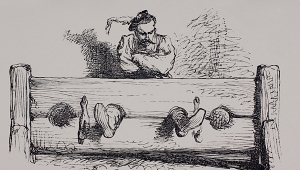| Columns Retired Columns & Blogs |
Listening #45 Page 2
No sense commenting on the quality of the wordplay: Some people will consider it witty and well-crafted (most of those will probably be urban males over a certain age who use the expression bon mot without irony) and others will not. But I can't ignore the matter of timelessness—or, in this case, the glaring shortage of same. That's why I asked my intelligent, worldly, non-homeschooled daughter if she knew who Lassie was. She said it's an Irish word for girl—and spent the next minute or so saying things like "Top o' the mornin' to ye, lassie, will ye fancy a wee pint?" in her funniest fake brogue. (She got that routine from a talking bottle opener we take out of the drawer every Saint Patrick's Day. Honest.)
The audience themselves
Millions of words have been written on the subject, but the simple truth is this: The difference between popular music that succeeds and popular music that doesn't has nothing to do with length or complexity or the number of chords. It has nothing to do with the distinctions between 12-bar blues and sonata-allegro form, and it has nothing to do with instrumentation, singing technique, or the way the performer dresses, wears his hair, or behaves toward his fans or their parents. The real difference is this: For popular music to succeed, a sizable chunk of the audience absolutely must hear themselves in the lyric.
That can be done simply and honestly (Carter and Ralph Stanley mourning their dead mother, Bob Dylan reminding us that William Zanzinger killed poor Hattie Carroll and got away with it) or by craftier means (doggerel-and-pony acts like Brooks & Dunn or Lonestar singing committee-written faux country songs about angry blue-collar workers and the simple pleasures of driving drunk). And, yes: For the listener who doesn't give a shit about anything and wishes to celebrate the fact lustily—we all have at least some of that in us, I think—there's nothing like the catchy nonsense of "Be-Bop-A-Lula," "Hound Dog," or "La Vida Loca."
That's not the only thing, of course: There's also the small matter of quality. As I suggested earlier, I measure quality in pop songs by the sounds of the words, and how evocative they seem, and whether they convey sufficient depth to reward repeated listenings.
Happily, there are still lots of people writing songs of very high quality—songs that stand up to the best of any era—and a great many of them are young, such as Joanna Newsom, Neko Case, and the ever-controversial Conor Oberst. Some older, established writers remain at or near the top of their game: Michael Penn, Aimee Mann, Martin Newell, and Andy Partridge. And, from time to time, a few of rock's elder statesmen remain capable of reclaiming earlier glories—such as Neil Young ("When God Made Me," from Prairie Wind), Keith Reid and Gary Brooker ("An Old English Dream," from Procol Harum's The Well's On Fire), and Dylan himself ("Standing in a Doorway," from Time Out of Mind).
Then there's Lee Feldman, a classically trained pop musician who brings a strong if decidedly off-center sense of melody to the art of traditional American songwriting, and whose lyrics betray a poetic sensibility in tune with the best of the 20th-century Americans (especially Theodore Roethke, whose "My Papa's Waltz" could easily hide on one of Feldman's albums). All of which is to say that Lee Feldman is unclassifiable.

Michael Fremer turned me on to Feldman's music when he wrote about it for Listener back in the early days of 2001, and my fondness for the Brooklyn-based singer-songwriter has since grown steadily. His third album, I've Forgotten Everything (Urban Myth UM-114-2), has just been released, and it's already an indispensable part of my pop-music collection. Almost half of the album's songs discuss aging or abandonment—not in a maudlin or self-pitying way, but impressionistically, with carefully chosen images and scraps of monologue. In "Me and My Sara Remaining," an elderly man talks about his changing neighborhood with a mixture of fear and resignation; in his plaintive, unaffected style, Feldman sings the opening line—"And all of the places are changing"—against a continually changing string of chords that never quite resolve, yet that support a strangely sad melody. And in "Give Me My Money," the album's thematic center, the narrator focuses his motley thoughts just long enough to express his frustration as something tangible:
Give me my money
I'm a human being
I used to write music that people could sing
Give me my footsteps
Where did they go?
I wish I had known that I needed them so
Some of the tunes on I've Forgotten Everything meander in a happy, childlike way— such as the upbeat "Big Women on the Shelves," the album's happiest and most triumphant moment. Others are more serious-minded, such as the stark setting for a creepy-funny lyric titled "Cave." That one opens with a solo trumpet playing a series of descending intervals, then switches to an ascending series of mildly dissonant chords led by a solo cello: It's almost Schmidt's Symphony 4 in miniature. The simplest melody of all is reserved for the closing number, "See You Again"—yet even then, the leitmotif of aging returns, as the final lines are sung by the Northside Senior Center Chorus. From Brooklyn, of course.
Lee Feldman's I've Forgotten Everything is unlike anything else in contemporary pop. The songs are alternately sad, whimsical, harrowing, and very funny (although the album's best laugh may be the visual joke on the disc itself). A third of the tunes are waltzes, and all of the melodies are catchy and challenging in more or less equal measure. Above all, the writing voice behind it all is kind, humane, and clever without being too clever: There's nothing arch about Feldman's music.
Every one of these songs is like a smile you can't read, yet that pulls you along in spite of yourself. Lee Feldman is one of the few musicians in contemporary pop whom I think of as an artist, and I've Forgotten Everything is far and away his best work so far. If you have a passion for good songwriting, you need this album.
The elder statesmen
Speaking of rock's elder statesmen: I'm often impressed—yet even more often horrified—by the way some performers have made the transition from their earlier and arguably more vital years. On the impressive side: Roger McGuinn, always the technophile, was the first person to alert me to the wonderful folk-music resource www.Mudcat.org (as well as to wonder why the heck I hadn't yet downloaded GeoClock software). King Crimson, a musical project I always respected but never really took to, also remains vital, with a seemingly endless series of evidently worthwhile live releases, and a conspicuously literate blogspot by leader Robert Fripp.
And speaking of Messrs. Brooker and Reid, they've survived the trip, too. New material continues to trickle from the venerable songwriting team behind Procol Harum; just as interestingly, their existing catalog has begun to attract a fresh stream of reinterpreters from among the ranks of amateur and professional musicians alike. (Maybe it's an aftereffect of the Jethro Tull–ish revolving-door approach the band took to matters of personnel.) Spurred on by the band's quasi-official website, webmastered by the excellent Roland Clare, a shifting musical cast known collectively as the Palers' Project has released a series of discs containing their own takes on the words of (mostly) Keith Reid, as set to the music of Gary Brooker, Matthew Fisher, and Robin Trower.
The third Palers' Project collection—titled Trace of a Feeling, after a line from the 1977 shoulda-been hit "Strangers in Space"—has now been released, and while the results are every bit as variable as the nature of the project would suggest, it has some astounding moments. Not to be missed are two (!) superb recastings of a fine Matthew Fisher solo tune, the unfortunately titled "Baby Can't You Feel My Love," and a rendering of another Fisher melody, the recent instrumental "Weisselklenzenacht," on a proper pipe organ by a proper pipe organist. (Funny how that works: Fisher recently announced that he's suing Brooker and Reid in a royalty dispute—and his material gets the album's best moments. Go figure.)
Trace of a Feeling may not be to everyone's taste, but in the words of two well-known anglers, it is "not unworthy of the perusal of most." Order it from the aforementioned Procol site, or visit www.palersproject.com.
- Log in or register to post comments




































